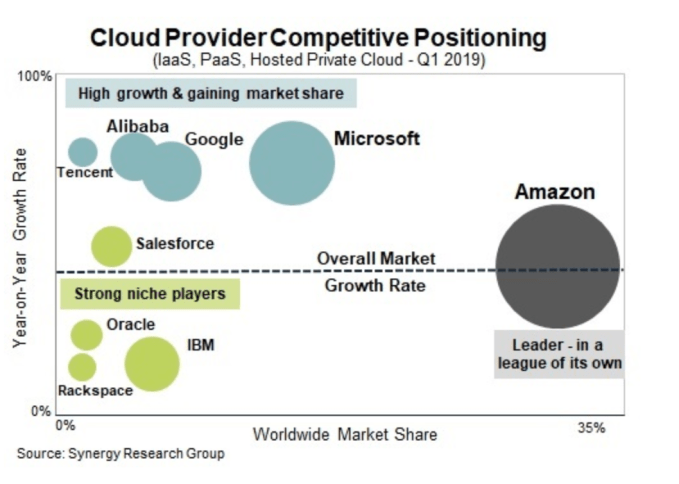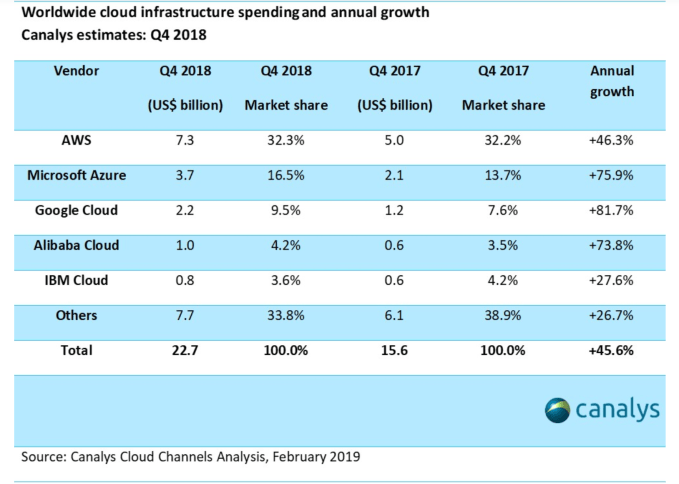It has to be a bit depressing to be in the cloud infrastructure business if your name isn’t Amazon. Sure, there’s a huge, growing market, and the companies behind Amazon are growing even faster. Yet it seems no matter how fast they grow, Amazon remains a dot on the horizon.
It seems inconceivable that AWS can continue to hold sway over such a large market for so long, but as we’ve pointed out before, it has been able to maintain its position through true first-mover advantage. The other players didn’t even show up until several years after Amazon launched its first service in 2006, and they are paying the price for their failure to see the way computing would change the way Amazon did.
They certainly see it now, whether it’s IBM, Microsoft or Google, or Tencent and Alibaba, both of which are growing fast in the China/Asia markets. All of these companies are trying to find the formula to help differentiate themselves from AWS and give them some additional market traction.
Cloud market growth
Interestingly, even though companies have begun to move with increasing urgency to the cloud, the pace of growth slowed a bit in the first quarter to a 42 percent rate, according to data from Synergy Research, but that doesn’t mean the end of this growth cycle is anywhere close.
“The overall growth rate has tailed off a bit due to the law of large numbers, but this should absolutely not be viewed as a weakness in the market. It is still growing at a very impressive rate for such a big market. Meanwhile, Amazon remains in a league of its own accounting for a third of the total worldwide market, even though four of the chasing pack have much stronger growth rates,” Synergy’s John Dinsdale wrote in a statement.
As Dinsdale pointed out, AWS continued to grow at a rate faster than the overall market, which is amazing given they’ve been in the market for 13 years. There is a tendency for growth to slow considerably over time as the market matures, but in AWS’s case it reported 45 percent growth in its most recent earnings report with $7.43 billion in revenue, up from $5.11 billion a year ago.
The others are growing faster, but like the law of large numbers that makes it harder to keep a strong growth rate going, the smaller you are, the easier it is to grow at a larger rate. With that in mind, the four companies in AWS’s rearview — Microsoft, Google, Tencent and Alibaba — are all growing at rates of over 70 percent.
While Synergy didn’t report on specific marketshare or growth numbers, their positioning graph shows that even Microsoft, which has around 15 percent of the market is not even close to AWS. The remainder are further back, still in single digits. While it’s commonplace to say there can only be one winner in a given category, while AWS is the clear market leader, the others are growing fast and still making significant revenue.

For comparison, Canalys, another firm that tracks the cloud infrastructure market has similar numbers and breaks out the specific growth rates. Note that its chart does not include Tencent.

Fighting for Hybrid
One thing that has happened over the last several years is the companies behind AWS (and to some extent even AWS itself) have decided to stake their claim in the hybrid space, that is a recognition that for the considerable future, customers won’t be moving lock, stock and barrel to the cloud. Instead, they will live in this in-between hybrid world where some workloads live in on-premises data centers and some live in the public cloud.
Vendors like IBM, Google, and Microsoft are trying to cater to these companies by offering a set of tools to make it easier to manage your data in a uniform way, regardless of where it lives. This is sometimes referred to as a cloud native approach (although the definition of that term is a bit fluid at the moment.)
Each one has taken its own approach, using acquisitions and strategic partnerships to push the idea to customers, most of whom are taking a multi-cloud approach and welcome these connections between vendors. Microsoft has been taking this strategy since even before Satya Nadella took over as CEO 5 years ago, building tools to help companies manage across environments and even offering Azure Stack, a mini version of the Azure public cloud stack you can install in your data center that behaves in a similar manner to its public cloud sibling.
Managed private cloud stacks trying to find their way in the enterprise
IBM’s biggest hybrid move was buying Red Hat last year for $34 billion. Just this week, we saw Satya Nadella appear at a Red Hat conference to announce Azure Red Hat OpenShift, Red Hat’s version of Kubernetes, which can run on Azure or in your private data center with a set of common administrative controls, which is the cloud native holy grail, one set of tools to rule them all.
Google pushed its hybrid strategy at Google Cloud Next last month. The primary piece here was Anthos. My colleague Frederic Lardinois described it in hybrid cloud management terms:
So with Anthos, Google will offer a single managed service that will let you manage and deploy workloads across clouds, all without having to worry about the different environments and APIs. That’s a big deal and one that clearly delineates Google’s approach from its competitors’. This is Google, after all, managing your applications for you on AWS and Azure.
Even AWS introduced AWS Outposts last Fall at AWS re:Invent, a new on-prem server to allow for the same type of hybrid management. In this case, you can manage your AWS cloud loads and onsite data in a consistent fashion.
All of this hybrid motion is about appealing to customer requirements and getting more marketshare. For now, though those companies not named AWS might be making some money in the cloud infrastructure market, but when it comes to marketshare, nobody is even close to Amazon. It turns out that first mover advantage is the real deal and Amazon is proving it.































Comment